Surf Champ: The surfing simulator 35 years ahead of its time that sank without a trace
- Published
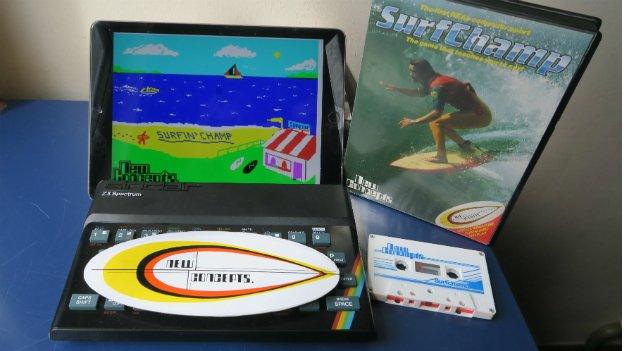
Surf Champ was released on the ZX Spectrum in 1985. It came with a miniature surfboard that you balanced on your keyboard and is shown here using an emulator on an iPad
Some sports seemed well suited to being simulated during life under lockdown, but surfing was not one of them.
For several weeks, only those within walking distance of real waves in the UK were allowed to ride them, leaving English champion Luke Dillon to complain at the start of May that "being at home is beginning to drive me mad. Surfing is not like other sports that you can do in your back garden".
What about your lounge, though? Because it turns out that being banned from the beaches does not necessarily leave you landlocked, at least not if you have a ZX Spectrum in your attic.
It probably sounds unlikely that a relic of the 1980s UK computer scene could provide a solution for suffering surfers in 2020, especially when the current crop of simulations for other sports are so sophisticated.
But a little-known game on the humble rubber-keyed 48K 'Speccy' was ahead of the wave when it came to virtual sports, all of 35 years ago, and is still arguably the most accurate surfing simulation there is.
This is the story of Surf Champ, which spawned the first esports tournament in 1985 and secured pre-sales that would have made its creators millionaires, but instead left them on the brink of bankruptcy as it sank without a trace.
Where it began - the surfing simulation aiming for the stars
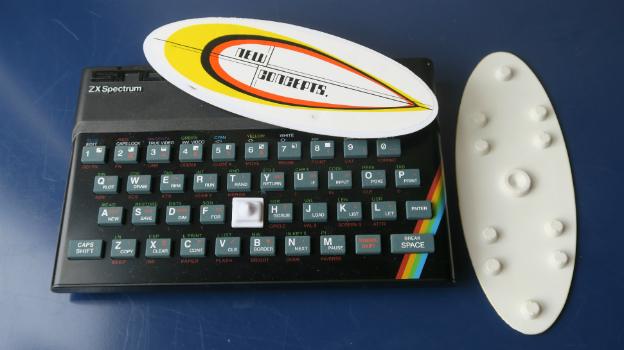
Surf Champ's surfboard sat on a special button on the Spectrum keyboard and had bobbles underneath that pressed down on different areas of the keyboard, depending on your hand movements
Surf Champ was the brainchild of maverick surfing scientist Dr Norman McMillan, who wanted to conquer the sporting world with the help of his complex algorithms.
Dr McMillan is still a scientist now, with a long list of academic and research achievements behind him - one of his latest projects is a drop-spectroscopy instrument being used by University College Dublin to help find a rapid diagnostic test for Covid-19.
In 1985, he was a 40-year-old physics and computer science lecturer at Carlow Regional Technical College in Ireland, who had an idea that he thought would revolutionise professional sport, decades before anyone else managed it.
He had teamed up with fellow academic John Frayne and celebrated astrophysicist Susan McKenna-Lawlor, who would go to play a prominent role with Nasa and Russia in experiments on international space missions to Mars, Venus and the moon.
They wanted a joint project that would allow them to pursue their individual interests, but could be commercially viable too. The UK's burgeoning home computer gaming market seemed ideal, but what should be the first subject?
"I was a surfer," explains Dr McMillan. "So, I knew about surfing and as a physicist I said I could do a computer game with a proper mathematical algorithm so it would be accurate, which of course it was.
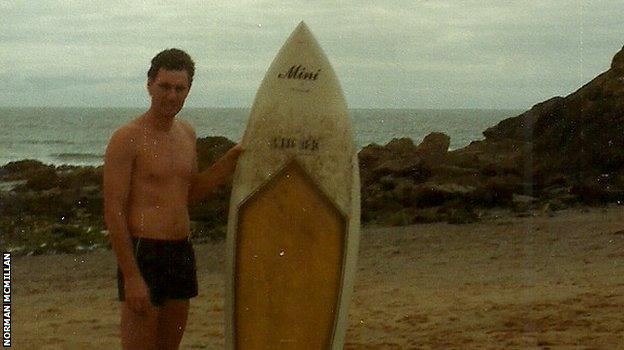
Dr McMillan had been surfing since the 1970s, from the start of the sport's explosion in popularity in the British Isles
"That was how Surf Champ started out, then John came up with the idea of the surfboard overlay for the keyboard. Susan's speciality was ultra-fast programming for the latest space technology of the time, which would help make it all work.
"Each of us put £20,000 into our company, New Concepts, which was a fortune in those days, but we needed more funds to get off the ground, so we went to the Industrial Development Authority (IDA) in Ireland.
"They gave New Concepts the money we needed to get Surf Champ launched as a product, and told us 'go and prove yourself if you want more funds'."
Sharpen your board skills, using a ZX Spectrum
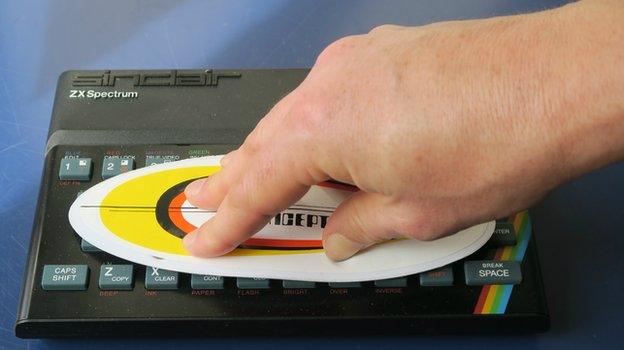
Your hand movements on the surf board were replicated on screen
Surf Champ's slogan boasted how it was 'the game that teaches you how to surf', which sounds somewhat optimistic, bearing in mind its surfboard measures 19cm nose to tail.
New Concepts needed credibility - and who better to ask than professional surfers themselves?
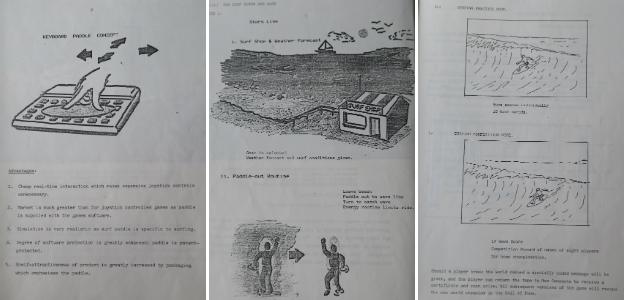
Design art-work and story-boarding for Surf Champ when it was in its conceptual stage. The game came with a surfing tutorial programme on Side B of its tape
In autumn 1985, McMillan and his son Doug headed for Rossnowlagh beach in Ireland for the European Surfing Championships, and had a huge slice of luck.
"There was not a wave in sight," remembers McMillan. "It was perfect for us because the surfers had nothing to do. They played the game non-stop instead, and all of them said it was absolutely accurate."
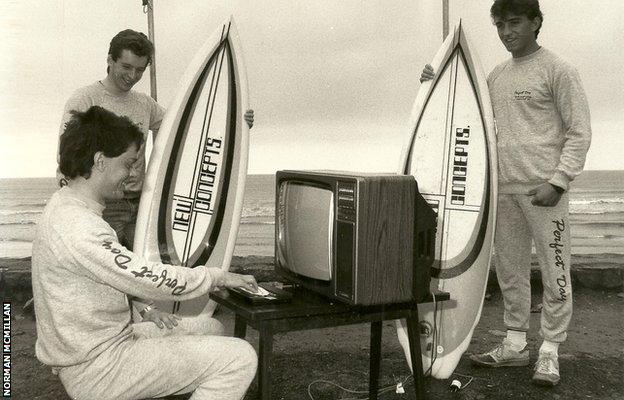
The Irish surfing team at the 1985 European Championship were pictured enjoying playing Surf Champ on the beach... Unfortunately their computer and TV were not plugged in
Among them was Jed Stone, then the reigning English surfing champion, who would soon collect another title - at the inaugural World Computer Surfing Championship.
"They set up some computers and showed us how to play," recalls Stone. "Then each country was asked to select four surfers for a surf-off - which I ended up winning."
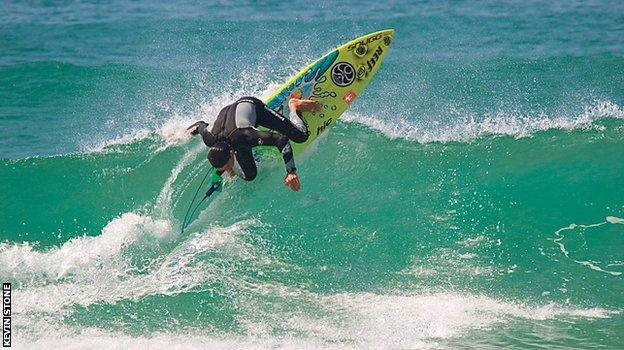
Known as 'Jedi', Stone has been surfing since 1972 and was European champion in 1991. He won the British veteran title eight times and finished fifth in the World Masters in 2008
'Your mind is thinking the same way as if you were standing up'
By this point, Surf Champ was making some serious waves in the surfing community, winning glowing endorsements from the International and European Surfing associations.
But it was proving harder for novices and casual games players to get to grips with, and its presentation was pretty primitive, even for its time. Could you really learn to surf by playing it?
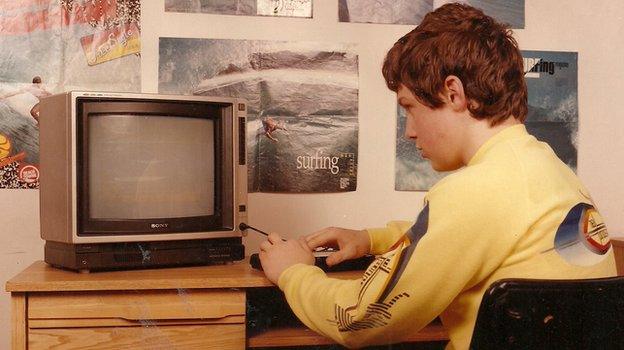
Surf Champ was not just aimed at existing surfers - New Concepts targeted the younger audience too with their promotional material
While he feels no game can capture the thrill of catching an actual wave, Stone still agrees with Dr McMillan's claims that Surf Champ was a way of teaching you some of the skills you needed.
"The basic principles are there," says the 66-year-old artist from Newquay, who has been surfing for almost 50 years and won an award for being Britain's most inspirational surfer in 2014 when he retired from professional competition.
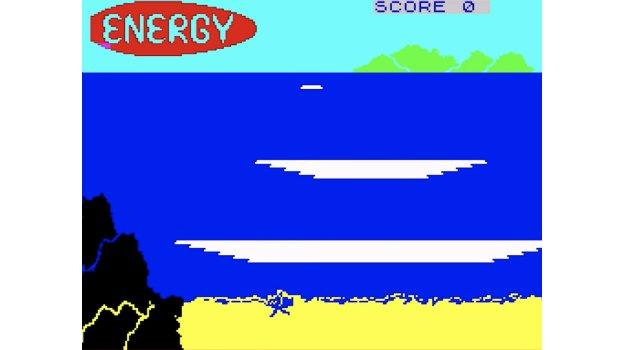
You start Surf Champ on the beach after selecting your height and weight, plus the type and length of your board and which gear to wear depending on the weather. You also have a decreasing energy bar relative to your movement - a doctor was consulted to determine how this would affect your performance
"Because you used the board, you did not have keys in your mind.
"You knew that if you leant forward on it, it trimmed in the wave on the simulation. If you moved back, say to the back left of the board, you would do a bottom turn.
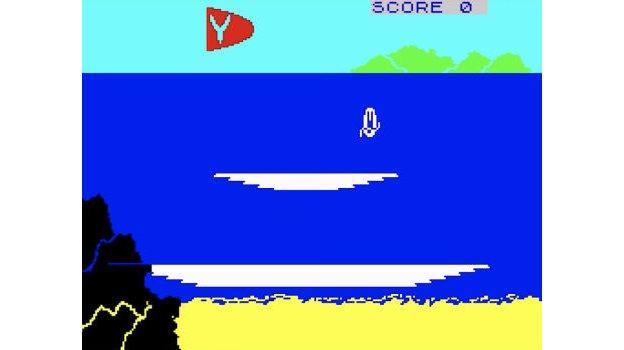
Then you use the real rip tide at Fistral Beach to paddle out to sea, dipping your board to ride over incoming waves, and turn when you are far enough out
"Your fingers are on the board so you are actually riding the wave in that way. I know it is not your feet, but your mind is thinking the same way it would be if you were standing up - so, in that respect, it was accurate, yes.
"The graphics look simple now, of course, but at the time there was nothing else like it, so it was a case of 'wow, look at this'.
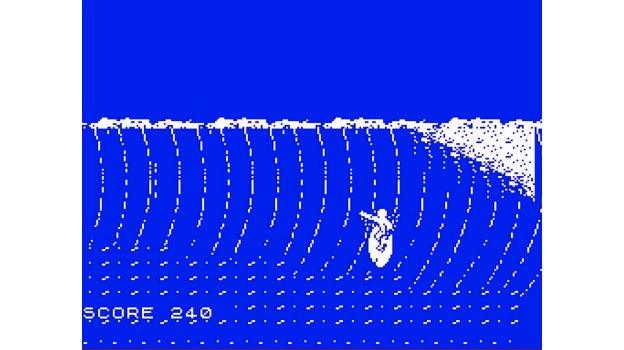
When you are in position to catch a wave, which were based on data collected at Fistral, the actual surfing starts. Stone scored 23,700 points to win the world title. If you bought the game and broke his record, you got a code that won you a cash prize
"Everyone was buzzing about it - it was a forerunner of what they are doing now, across all sports.
"A lot of the surfers played 'True Surf' on their phones during lockdown, which is the culmination of New Concepts' early endeavours. It is the same as Surf Champ, only without the feel of the board."
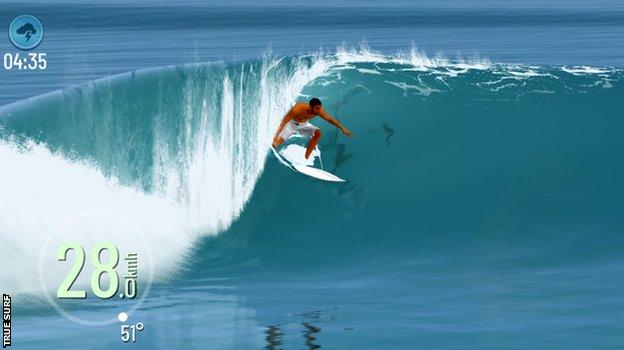
True Surf is is the official game of the World Surf League and and takes players around the world in online competitions using the same location as actual World Tour events when they are being staged
True Surf looks a lot slicker - an iPhone has around 144,000 times more memory than the 48K Spectrum - and uses real-time weather with a network of global cameras, so you get the same sized waves that are actually happening at the 21 classic beaches you can 'visit'.
Surf Champ only had one beach - Fistral in Cornwall - but the idea was to add more in later editions, with competitions offering prizes for the public throughout 1986.
None of that would happen, however, so the first World Computer Surfing Championship was also the last.
"I am still undefeated to this day," added Stone, with a smile.

Jed Stone is now a professional artist and his latest project is a mural in Newquay thanking NHS nurses for their dedication during the coronavirus pandemic
What went wrong? The money ran out
Letting people surf at home was supposed to be just the start for New Concepts.
Keyboard skiing, water-skiing and sailing were all in the pipeline. And, 20 years before Nintendo brought the Wii to the market, so were motion-sensitive controls.
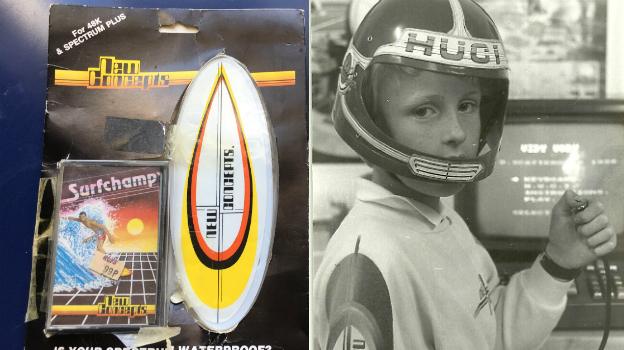
Surf Champ's original packaging on its Spectrum release (left) and New Concepts' Head-up Control Interface, or HUCI (right). This motion-sensitive interface was initially going to be put in a helmet and used in driving simulators, but it was hoped it could be used on a full-size surf board too
Prototype models were made and more governing bodies were interested in getting on board with sponsorship for training and tutorial purposes - but for all that to happen, Surf Champ had to succeed first.
With a grimace, Dr McMillan explains what happens next, and how his dream died.
He says: "I went over to London in October 1985 to speak to different distributors and one of them said 'right, it is coming up to Christmas, we will give you an order for 180,000 now - can you produce 200,000 of these?
"The game was going to cost £12 and New Concepts would get £4 for each copy sold, so we would have made hundreds of thousands, which would be worth millions today.
"I said: 'Wow… but hang on, are you sure you can sell them all?' And they said: 'Yes, for sure.'
"So we went back to the IDA and said: 'We have run out of money and we need a bit more help with manufacture to meet this order.'
"But we were the first computer games company in Ireland so they had no idea how that industry worked, and how small a window we had to get this out.
"They said: 'Oh, no this is only a marketing trial. You have to do test marketing before you get the full funding… and by the way, the maximum number of games you can produce now is 3,000.'
"They were only following procedure but, just like that, they had chopped our legs off. It was a disaster.
"By the time I had finished arguing with them, it was late November. They had not changed their mind and there was no time left.
"The 3,000 games we did make sold in the blink of an eye but I knew we should be doing it properly, because it might be the only chance we ever had - and it actually was."
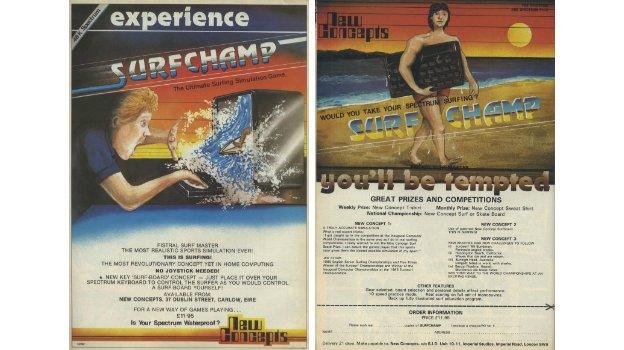
Magazine adverts for Surf Champ claimed it was 'the most realistic sports simulation ever' and listed the future computer surfing competitions that would never take place.
After applying unsuccessfully to get a further IDA grant to release Ski Champ - complete with a miniature pair of skis - New Concepts were told the only way to get the funding they now desperately needed was if they used it to give Surf Champ a belated full release in 1986.
"I said OK, but we can't do it on the Spectrum now, because this was several months after it had first come out and its time had gone - you can't just bring out a game for a second time.
"Instead we did it on the Commodore 64. We got some OK reviews - but we only sold 600 copies, and we were completely bankrupt by this point so we had no money to carry on."
From the jaws of success, New Concepts had - to use the most appropriate surfing terminology - wiped out.
So Surf Champ's innovative ideas, scientific prowess and forward-thinking marketing could only take it so far. Its plastic surfboard is remembered now as little more than a gaming gimmick, when it promised to be a whole lot more.
"We had one shot, and we missed it," says Dr McMillan. "But we were way ahead of our time - and as far as surfing simulations go, I am still very proud now that some of the best surfers in the world told me how accurate it was."
With thanks to Damian Scattergood.